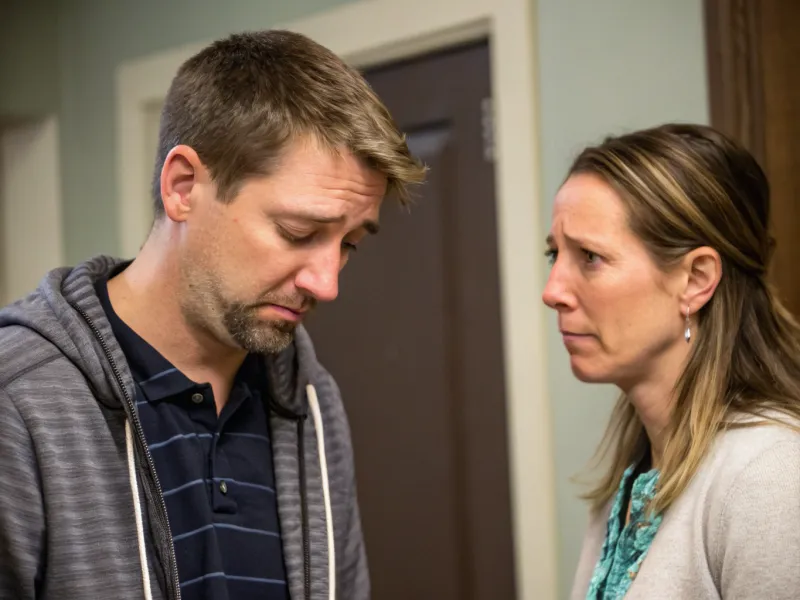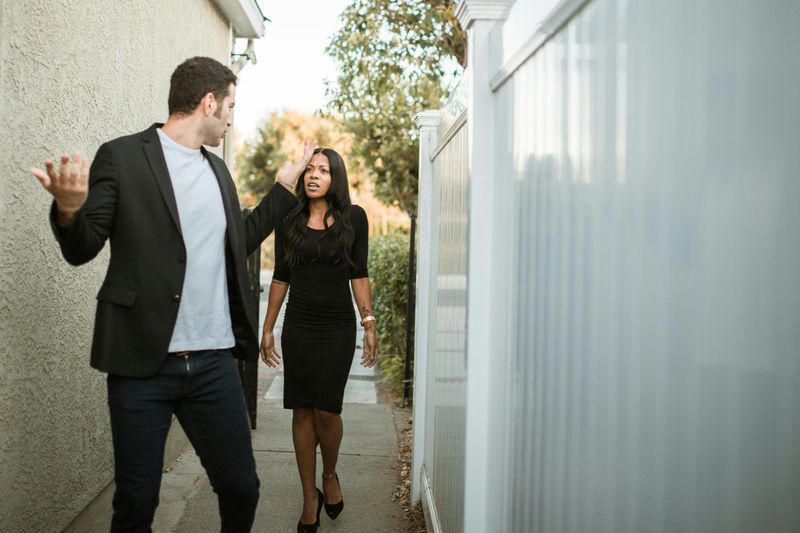30 Honest Reasons Why Men Walk Away From Women (From a Guy’s Perspective)

When a man decides to walk away from a relationship, it often leaves a trail of confusion and heartbreak. As a marriage counselor, I’ve seen firsthand how these situations unfold.
The reasons men leave aren’t always straightforward or easy to understand. They span from emotional disconnects to unmet expectations, touching upon a myriad of complex interactions that many may not even recognize.
This post aims to unravel these reasons with honesty and clarity, shedding light on the emotional and psychological underpinnings that drive men to such decisions.
Through this understanding, I hope to offer both men and women the insight needed to build stronger, more fulfilling relationships.
1. He feels unappreciated

Appreciation is the glue that holds many relationships together. When a man consistently goes out of his way to make his partner happy, only to be met with silence or indifference, it chips away at his motivation. It’s not about grand gestures; even small acknowledgments can make a big difference.
Over time, the lack of gratitude can feel like a heavy weight. He might start to question his worth in the relationship and whether his efforts are genuinely valued. This internal struggle can lead him to seek validation elsewhere or consider leaving to find a partnership where he feels seen and appreciated.
Open communication about needs and expressions of gratitude can prevent this disconnect. Simple words of thanks or acts of appreciation can reignite his desire to invest in the relationship, fostering a healthier, more balanced connection.
2. He’s emotionally drained

Emotional exhaustion often creeps in unnoticed until it becomes overwhelming. Continuous conflicts or lack of emotional support can lead a man to feel drained, as if he’s constantly fighting an uphill battle. This can be exacerbated in relationships where problems seem unresolvable.
When emotional fatigue sets in, a man may begin to detach as a defense mechanism. It’s not that he doesn’t care, but rather he’s protecting himself from further emotional harm. This detachment can be mistaken for indifference, when in fact, it’s a cry for help.
Addressing and resolving conflicts constructively is key. Encouraging open discussions and actively listening can help in reversing this emotional withdrawal, allowing both partners to reconnect on a more empathetic and supportive level.
3. He doesn’t feel needed

Feeling needed is a basic human desire, and for many men, it’s tied to their sense of purpose in a relationship. When a man feels replaceable or unnecessary, it can deeply affect his self-esteem and connection to his partner.
In modern relationships, where independence is often celebrated, striking a balance between self-sufficiency and interdependence is crucial. A man needs to feel like he plays an integral part in the relationship, contributing to its success and happiness.
Encouraging collaboration and acknowledging each other’s strengths can foster a sense of partnership. Simple gestures of seeking his input or valuing his support can go a long way in making him feel indispensable, reinforcing his commitment to the relationship.
4. The connection feels one-sided

Feeling like you’re the only one investing in a relationship can be disheartening. When a man feels like he’s always the one reaching out, planning, or initiating, it can create a sense of imbalance.
This perception of a one-sided connection can lead to frustration and eventually disengagement. He might begin to question if the effort is worth it when it seems unreciprocated or unnoticed.
To combat this, both partners should strive for a more balanced exchange of effort and affection. Engaging equally in planning activities, sharing responsibilities, and showing interest in each other’s lives can strengthen the bond and prevent feelings of isolation or neglect.
5. She tries to change him

When a man feels like he’s not enough or that he needs to change to fit his partner’s ideal, it can be incredibly demoralizing. This pressure to alter who he is at his core can lead to resentment and withdrawal.
The initial charm of a relationship often lies in acceptance, yet over time, expectations can shift, leading to attempts to mold each other. Men, like women, seek acceptance for who they are, flaws and all.
Embracing each other’s differences and discussing expectations positively can enhance mutual respect and understanding. Accepting partners as they are, rather than trying to change them, fosters a nurturing environment where both individuals can grow together, rather than apart.
6. He senses a lack of respect

Respect is foundational in any relationship. When a man feels disrespected, it can undermine his confidence and commitment. This lack of respect might manifest in dismissive behavior, criticism, or neglect, leaving him feeling undervalued.
Respect is as crucial to men as love is to women. Feeling respected and valued can greatly influence a man’s happiness and willingness to invest in a relationship.
Demonstrating respect through active listening, valuing his opinions, and acknowledging his contributions can rejuvenate the relationship. Building a respectful environment encourages a deeper connection, mutual understanding, and long-term partnership stability.
7. She’s emotionally unavailable

Emotional availability is a cornerstone of a thriving relationship. When a man perceives his partner as emotionally distant, it can lead to feelings of loneliness and inadequacy. This disconnect can be particularly painful if he feels he’s making an effort to connect.
Emotional unavailability may stem from past traumas, stress, or a fear of vulnerability. Regardless of the cause, it signals a barrier to deeper intimacy and connection.
Cultivating emotional openness requires patience and understanding. Encouraging honest conversations about feelings and providing a safe space for vulnerability can gradually bridge the emotional gap, fostering a more intimate and trusting partnership.
8. The relationship lacks intimacy

Intimacy is an essential component of any intimate relationship, encompassing both physical and emotional connections. When intimacy wanes, it can make a relationship feel hollow or transactional.
A lack of intimacy might manifest as decreased physical affection or emotional sharing, leading one partner to feel isolated. This gap can grow over time, causing one or both partners to seek fulfillment elsewhere.
Reigniting intimacy requires conscious effort and communication. Setting aside time for each other, being present, and sharing thoughts or desires can invigorate the bond. Prioritizing intimacy helps maintain a vibrant and fulfilling connection.
9. He feels more like a provider than a partner

Feeling like a provider rather than a partner can create a sense of imbalance in a relationship. When a man’s contributions are primarily seen through the lens of financial support, it can overshadow the emotional and relational aspects of the partnership.
This dynamic often leads to feelings of being undervalued or reduced to a single role. A partnership thrives on mutual support and shared responsibilities, beyond just financial aspects.
Encouraging a balance between financial and emotional contributions can alleviate this burden. Acknowledging and appreciating each other’s roles, regardless of their nature, fosters a holistic view of partnership, enhancing both connection and satisfaction.
10. She brings up past mistakes constantly

Dwelling on past mistakes can prevent a relationship from progressing. When a partner frequently revisits old grievances, it can create a cycle of blame and defensiveness, hindering growth and healing.
Constant reminders of past errors can lead to resentment and frustration. It prevents both partners from moving forward, keeping them trapped in a loop of unresolved issues.
Forgiveness and forgetting are crucial for progress. Focusing on present and future goals, and letting go of past missteps, can help build a more positive and optimistic path forward. This approach fosters healing, allowing the relationship to thrive beyond past conflicts.
11. He feels misunderstood

Feeling misunderstood can erode the foundation of any relationship. When a man feels that his thoughts, feelings, or intentions are consistently misinterpreted, it can lead to frustration and detachment.
Misunderstandings may arise from communication gaps, assumptions, or differing perspectives. These can cause a man to feel isolated, as if his true self is not acknowledged or valued.
Bridging the gap requires active listening and open dialogue. Encouraging each other to express thoughts and feelings without fear of judgment can foster understanding. This mutual empathy helps both partners feel heard and appreciated, strengthening the relationship.
12. She prioritizes others over him

Feeling secondary to others in a partner’s life can lead to feelings of neglect and insignificance. When a man’s partner consistently prioritizes friends, family, or work over him, it can diminish his sense of importance in the relationship.
This prioritization might make him question his place and value within the partnership. Over time, it can erode his emotional investment and willingness to contribute.
Balancing relationships with others while nurturing the primary partnership is vital. Making time for each other and showing that he is a priority can reassure him of his significance, reinforcing the bond and encouraging mutual dedication.
13. He craves independence

Independence is a vital aspect of personal identity and self-fulfillment. When a man feels smothered or overly dependent on a relationship, he might crave the freedom to pursue his interests or alone time.
This desire for independence is not necessarily a reflection of dissatisfaction but rather a need for balance. A relationship should allow both partners to grow individually while nurturing their connection.
Encouraging personal pursuits and respecting boundaries can help meet this need. Supporting each other in maintaining individuality amidst togetherness fosters a healthier, more balanced partnership, where both partners can thrive.
14. She’s overly critical

Constant criticism can wear down even the strongest of individuals. When a man is frequently subjected to nit-picking or judgment, it can undermine his self-esteem and happiness.
Constructive feedback is essential, but when criticism becomes habitual, it can create a toxic environment. This leaves a man feeling inadequate and unappreciated, potentially leading to disengagement.
Focusing on positive reinforcement and constructive dialogue can transform the dynamic. Acknowledging strengths and offering support can help build a nurturing environment, encouraging growth and strengthening the relationship.
15. The relationship feels stagnant

Stagnation in a relationship can lead to complacency and disinterest. When growth ceases and routines become mundane, it can feel as if the relationship is stuck in a rut.
This lack of progression can be disheartening, causing one or both partners to question the relationship’s longevity and fulfillment.
Reinvigorating the relationship with new experiences and shared goals can rekindle excitement. Exploring new hobbies, setting mutual aspirations, and breaking away from routine can infuse freshness and vitality into the partnership, reigniting the passion and connection.
16. He seeks personal growth

Personal growth is a lifelong journey. When a relationship hinders this development, it can create feelings of confinement and frustration. Men, like women, seek to evolve and better themselves continually.
If a relationship lacks support for personal aspirations, it might lead him to reassess its alignment with his goals. The absence of encouragement can make him feel stifled, prompting a desire for change.
Supporting each other’s growth and aspirations can create a more fulfilling relationship. Encouraging personal development and celebrating achievements together fosters a supportive and enriching partnership, where both individuals can flourish.
17. She’s emotionally manipulative

Emotional manipulation can undermine trust and happiness in a relationship. When a partner uses guilt or coercion to control a man’s actions or feelings, it creates an unhealthy dynamic.
This manipulation may make him feel trapped or powerless, breeding resentment and eroding trust. The constant emotional tug-of-war can make the relationship feel more like a battleground than a safe haven.
Establishing clear boundaries and open communication can help address manipulation. Encouraging honesty and respect in interactions fosters a healthier environment, reducing manipulative tendencies and promoting genuine connection.
18. He feels his dreams are unsupported

Support is crucial for chasing dreams. When a man feels his aspirations are dismissed or undervalued by his partner, it can lead to feelings of isolation and frustration.
The lack of encouragement may cause him to doubt the relationship’s alignment with his future. Dreams and goals often serve as a source of motivation and fulfillment, needing nurturing from both partners.
Sharing dreams and providing mutual support can strengthen the bond. Encouraging each other’s ambitions and celebrating successes together fosters a shared vision of the future, reinforcing commitment and connection.
19. She’s financially irresponsible

Financial irresponsibility can strain even the strongest relationships. When a partner consistently exhibits reckless spending or poor financial judgment, it can lead to stress and conflict.
Money matters often reflect deeper values and priorities. A lack of financial compatibility can create tension, leading a man to question the relationship’s viability.
Open discussions about finances and establishing mutual goals can help align priorities. Collaborating on budgets and respecting each other’s financial perspectives fosters trust and reduces conflict, creating a stable and harmonious partnership.
20. He feels overshadowed by her success

A partner’s success should be a source of pride, yet it can sometimes lead to feelings of inadequacy or insecurity. When a man feels overshadowed by his partner’s achievements, it may affect his self-esteem.
These feelings are often rooted in societal expectations or personal insecurities, not the partner’s success itself. However, they can create an emotional distance if not addressed.
Embracing each other’s accomplishments and fostering an environment of mutual celebration can prevent this resentment. Recognizing and supporting each other’s successes enhances the relationship, turning individual achievements into shared victories.
21. She’s indifferent to his passions

Passions and hobbies are a significant part of personal identity. When a man feels his interests are ignored or belittled by his partner, it can lead to feelings of isolation and disconnect.
Indifference towards his passions can make him feel unseen or unvalued, impacting his emotional connection to the relationship. Everyone seeks a partner who appreciates and encourages their interests.
Showing genuine interest and support in each other’s hobbies can bolster the relationship. Engaging in or acknowledging these passions fosters a sense of belonging, reinforcing emotional ties and shared happiness.
22. He’s frustrated by communication gaps

Effective communication is the backbone of any healthy relationship. Persistent misunderstandings or lack of communication can create significant barriers.
When a man finds it difficult to convey his thoughts or feels unheard, it can lead to frustration and withdrawal. Communication gaps often stem from differing communication styles or unspoken assumptions.
Practicing active listening and seeking clarification can bridge these gaps. Encouraging open, honest dialogue fosters understanding and connection, reducing friction and enhancing the relationship’s depth and resilience.
23. He feels emotionally unsupported

Emotional support is a fundamental need in any relationship. When a man feels emotionally unsupported, it can lead to feelings of neglect and isolation.
This void may arise from a lack of empathy or presence during challenging times, leaving a man to fend for himself emotionally.
Building a supportive relationship requires active engagement and understanding. Being present, offering comfort, and showing empathy create a nurturing environment that reinforces emotional bonds, ensuring both partners feel valued and connected.
24. She’s not interested in his family or friends

Family and friends often form a vital support network. When a partner shows disinterest in these connections, it can feel like a rejection of a significant part of a man’s life.
This indifference might lead him to question the relationship’s depth and potential for future integration into his life. Relationships thrive on shared communities and mutual appreciation of each other’s circles.
Encouraging participation and showing interest in each other’s social lives strengthens bonds. Building connections with family and friends fosters a sense of belonging and acceptance, enhancing the relationship’s overall harmony.
25. He feels she’s not invested in the future

Future planning is an integral aspect of a committed relationship. When a man feels his partner is not invested in building a shared future, it can create uncertainty and doubt.
This lack of commitment to future goals or dreams may lead him to question the relationship’s direction and longevity. A shared vision is crucial for mutual growth and fulfillment.
Engaging in discussions about future aspirations and aligning goals can create a cohesive path forward. Building a shared vision fosters unity and encourages both partners to invest in a promising, fulfilling future together.
26. She undermines his confidence

Confidence is a vital component of self-esteem and relationship satisfaction. When a partner consistently undermines a man’s confidence, it can erode his sense of self-worth.
This undermining might manifest through criticism, doubts, or dismissive behavior, leading him to feel unsupported and undervalued.
Encouraging confidence through positive reinforcement and support can transform this dynamic. Celebrating achievements and offering genuine praise help build a nurturing environment where both partners feel empowered and appreciated.
27. He desires more adventure

Adventure and spontaneity can add excitement and vitality to a relationship. When a man craves new experiences but feels his partner is uninterested, it can lead to dissatisfaction.
This desire for adventure is often about seeking shared memories and growth, experiencing life beyond the routine.
Embracing spontaneity and seeking new experiences together can invigorate the relationship. Planning trips or trying new activities fosters excitement and connection, creating lasting memories and deepening bonds.
28. She’s overly dependent on him

Dependence in a relationship should be balanced with independence. When a partner relies excessively on a man for emotional, financial, or decision-making support, it can feel burdensome.
This over-reliance can lead to feelings of pressure and stress, as if he is solely responsible for the relationship’s well-being.
Encouraging independence while offering support is crucial. Promoting self-sufficiency and mutual reliance ensures a balanced partnership, where both individuals contribute equally and feel empowered, reducing stress and enhancing satisfaction.
29. He Needs Space

In any relationship, personal space is important. Some men might feel overwhelmed if they don’t have enough time to themselves, leading to a feeling of suffocation. It’s crucial for both partners to respect each other’s need for solitude.
Encouraging time apart can strengthen a bond, allowing individuals to recharge mentally. This balance helps maintain personal identity within the relationship.
Creating a routine that respects each other’s personal space can help. Open communication about these needs usually ensures both partners feel understood.
30. Loss of Attraction

Attraction isn’t solely about looks. Emotional and intellectual connections play significant roles. Over time, if these connections diminish, attraction may wane, leading one partner to reconsider their involvement.
Keeping the spark alive requires effort from both sides. Trying new activities together and maintaining open dialogue can reignite the flame.
Acknowledging and addressing changes in attraction is essential. It ensures both partners can work towards rekindling their connection or part ways amicably.
